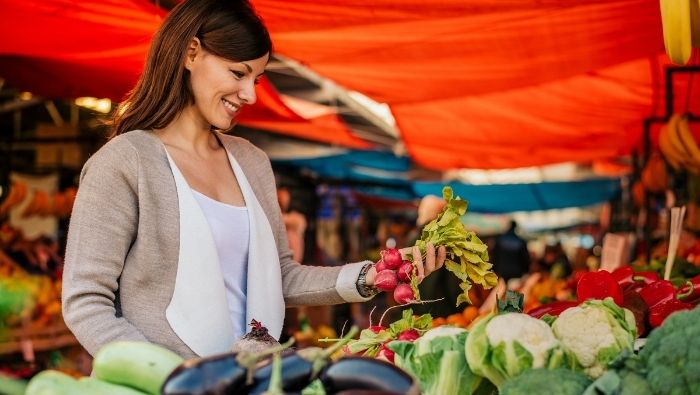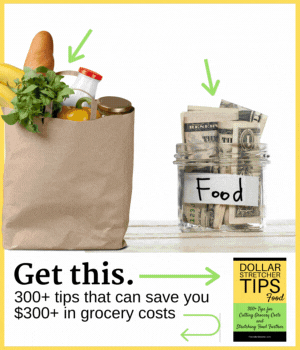A Buying Guide for the Farmers Market

Whether you’re hoping to eat healthier or support local farms and small businesses, this guide to shopping the farmers market can help you save.
Although shopping at your local farmers market is a great way for you to find the freshest produce available in your area, you’re more than likely going to be spending more money for this fresh produce, right? Not necessarily.
Although farmers markets are still known for having higher prices when compared to your local supermarket, it’s still possible for you to find some good deals. This is especially true if you’re someone who already buys organic.
In fact, if you already buy organic, the price difference between the market and the store is truly minimal, making buying organic fresh produce at your local farmers market your best choice.
Comparing Prices
First, there is a difference between the foods being sold at the farmers market and the grocery store. Market vendors truly care about growing a quality product and tend to offer produce that more than likely was harvested within days.
Mass produced store produce can sit for weeks without being sold. Because produce starts to lose its nutrients as soon as it’s picked, you’re simply not getting these nutrients when buying produce at your local grocery store.
Now, when it comes to buying non-organic, lettuce, cucumbers, peas and melons tend to be cheaper at the farmers market. In fact, the price of lettuce was found to be an impressive 40% cheaper when bought at the farmers market. Cantaloupe offers an expected savings of at least 50%, and if you’re looking for peas, you can expect to save about 25%. Cucumber savings are minimal with store prices costing you only about 5% more.
Non-organic foods that you can definitely expect to pay more for at your local farmers market often include blueberries, squash, watermelon, tomatoes, peppers and potatoes. If you choose to buy these items at your local grocery store, expect to pay between 20% and 30% less.
Related: 14 Ways To Buy Produce for Less
Sign Up for Savings
Subscribe to get money-saving content by email that can help you stretch your dollars further.
Twice each week, you'll receive articles and tips that can help you free up and keep more of your hard-earned money, even on the tightest of budgets.
We respect your privacy. Unsubscribe at any time.
What To Buy?
Definitely buy what’s currently in season. This is the time when you can get access to the freshest produce, as well as save some bucks. Most growers will be selling the same seasonal foods, so the prices will be very competitive. And since there will be a lot of seasonal produce available, the vendors are mindful that they’ll need to sell it quickly, so it won’t go bad.
Surprisingly, many people won’t buy a piece of produce if it doesn’t look perfect. Guess what? Ugly food tastes the same as pretty food, so you can save even more by buying imperfect produce.
When To Shop?
You’ll need to check out the day(s) and hours your local market sets up. If you’re not available during their operating hours, check with family and/or friends to see if they’re available.
If you go early, you’ll be presented with the best selection of food items. If you go late, you’ll get the best deals as most vendors would rather sell at a lower price than to take the item home.
Many vendors are also open to selling in bulk at the end of the day, so make an offer.
Tips
- Get to know your food producer. They’re an authority on what they sell.
- Don’t be afraid to try new foods. Ask the vendor what it is and how to best prepare it. You may just find a new food favorite!
- Bring a small cooler for things like lettuce and eggs.
- Use a different colored bag for different food categories like fruit, vegetables, baked goods, herbs, flowers, etc.
- If you are looking for organic, just ask! Not all vendors use organic methods when growing their crops.
- Bring small bills. Customers are too quick to pull out a $10 or $20 to pay for a $3 item.
- Ask for a discount for buying in bulk.
Good To Know
While some farmers markets can be fairly small, others can have literally hundreds of vendors selling their wares. This makes it a good idea for you to walk around before buying as you may find the same or similar items for a better price (even though most markets make it so that all prices are comparable). If you shop within the last 15 minutes of the farmers market closing, you’ll save even more.
Reviewed July 2023
About the Author
Laura Foor is a freelance writer who has specialized in writing quality articles for online publication for seven years. Graduating from UCB with a degree in Environmental Sciences in 2009, she also works part time as a Farmers Market manager where she focuses on healthy food education.
Wouldn't you like to be a Stretcher too?
Subscribe to get our money-saving content twice per week by email and start living better for less.
We respect your privacy. Unsubscribe at any time.
Popular Articles
On After50Finances.com
- 9 Things You Need to Do Before You Retire
- You Didn’t Save Enough for Retirement and You’re 55+
- When Empty Nesters Reorganize and Declutter Their Home
- Reinventing Your Career in Your 50s or 60s
- What Mature Homeowners Should Know about Reverse Mortgages
- 2 Reasons to Collect Social Security Benefits As Soon As Possible



